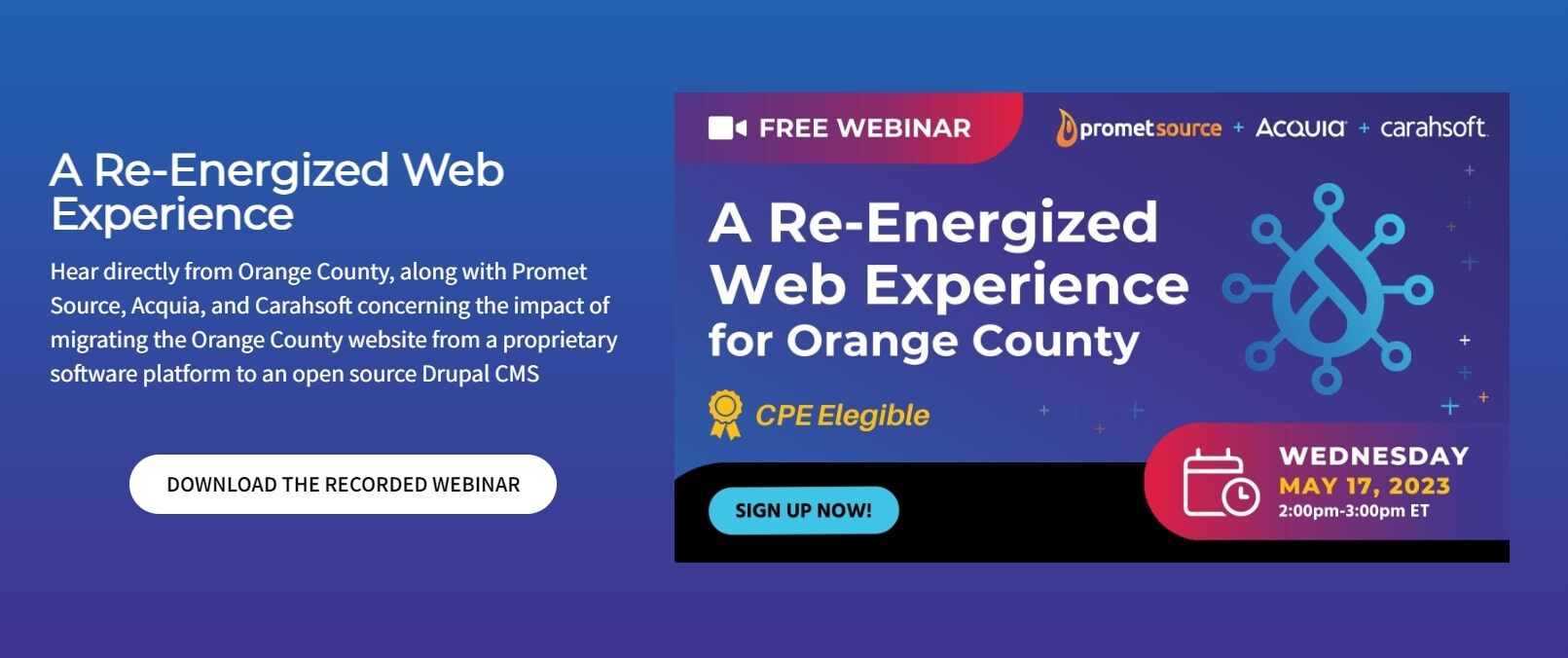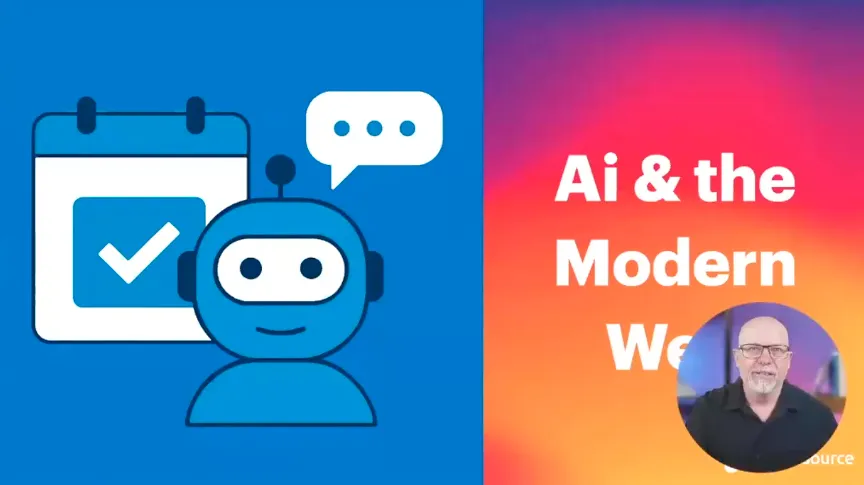Why Open Source for Government


Table of Contents
Takeaway: By choosing open source, public sector organizations can better serve their constituents while responsibly managing taxpayer resources. As demonstrated by Orange County's successful migration, open source empowers government agencies to create more flexible, secure, and cost-effective digital experiences.
SWITCH TO OPEN SOURCE—TELL US ABOUT YOUR PROJECT
Last week, one of the largest and most populous counties in the United States launched a new website our team at Promet Source had the privilege to design, build, and manage the content migration from a proprietary CMS.
Seeing this beautiful multi-site project through to completion was more than a labor of love. We viewed it as a rescue mission from a costly, locked-in software licensing contract and toward the flexibility and freedom of an open-source, Drupal CMS.
We are passionate at Promet about open source for government, as well as Drupal for government for lots of good reasons. Quite simply, we believe that public funds should not pay for private code.
Public funds should not pay for private code.
While there are a few misconceptions about open source that can be a cause for concern within both the private and public sectors, government entities at every level are moving toward open source, and this is particularly true within the federal government. Cost savings and security are the driving forces that are fueling open-source software. Innovation, agility, and accountability are powerful factors, as well.
The open-source advantage
Most of us tend to be quite familiar and comfortable with a proprietary or competitive mindset in which the secret sauce of the solutions we’ve developed is held as a closely guarded secret.
Even though the open source world operates more from the perspective of Kenneth Blanchard’s famous quote: “None of us is as smart as all of us,” open source is not an “either/or” option.
Open source is unequivocally good for business, good for government, and essentially just good.
In fact, Drupal 10.1 is the first version of Drupal that is now considered a Digital Public Good as approved by the Digital Public Good Alliance (DPGA).
Some may disagree with me on the advantages of open source, so let’s break it down into what I believe to be the four top reasons why open source is a better option for government websites.
- Collective brainpower
- Auditable security
- Freedom from costly licensing contracts
- Value-added support relationships
1. Collective brainpower
Consider a web development agency that creates proprietary software for government sites. The company might employ 10, 20, or possibly even upwards of 100 highly trained and talented developers.
Nothing, however, that happens within or among a team of proprietary developers can compare to the innovation, collective energy, and sheer brainpower of the 1M+ worldwide Drupal community members, 100,000 of whom are:
- Actively working with the cod
- Making refinements
- Providing support
- Creating documentation
- Sharing networking opportunities,
- Building freely available modules
2. Auditable Security
Security is often the greatest source of skepticism with open source, but the fact is, better security is an essential advantage.
Open-source software allows for thorough auditing of the code for purposes of detecting potential security threats. Site owners can modify the code as they see fit—whether to enhance security or customize a site to meet their specific needs.
Related: 5 Essential Cybersecurity Questions to Ask IT Vendors
The U.S. Department of Defense is a strong advocate for open source, which says it all. Is there an organization on Earth more concerned with data confidentiality and security than the Department of Defense?
Reasons why we at Promet Source—along with much of the Federal Government—are on the same page as the DoD concerning open-source software tie back to better and more extensive brainpower.
The Drupal community is constantly monitoring for security threats and alerting Drupal support partners, and users are thoroughly empowered on their own to shore up any vulnerabilities that they detect.

Contrast the level of attention devoted to open-source security to the relatively small and inherently limited teams that are focused on the security of proprietary software.
On the surface, it might appear that proprietary software has a security edge due to the fact that the code is hidden.
Lack of access to the code, however, does not translate into protection from a successful breach. Notorious attacks with a global impact and lesser-known activities of bad actors have proven this point time and time again.
3. Freedom from costly licensing contracts
When asked to cite the primary advantage of open source, lower costs tend to top the list for both the public and private sectors.
Federal, State, and local governments are on the hook for billions of dollars yearly for costly software licensing contracts. To an increasing degree, open-source software is viewed as a means to gain control over IT spending.
In fact, in our study on government CMS usage trends, we see that larger government entities tend to favor open-source solutions like Drupal.
While apples-to-apples comparisons between proprietary and open-source can be difficult, total cost of ownership for open-source software is often far lower. Proprietary software generally includes both an upfront purchasing cost and an ongoing licensing fee, which covers updates and support.
This is why Orange County estimates saving an annual cost of over $100,000 since switching to Drupal.
Open source options such as Drupal are free to use without any licensing or vendor lock-in. Drupal site owners generally contract for ongoing support to cover security and other essential updates, but not only can they choose from among a wide range of support providers, they can also choose to have an in-house expert manage and maintain their site.
Note: We have a couple of Drupal comparison blogs (linked in our footer) worth checking out.

4. Value-added support relationships
Proprietary licensing contracts represent vendor lock-in—for better or for worse. Open source equals options for support, which means competition for the best pricing, the best service, and the greatest value.
After we develop and launch a Drupal website for a client, they have essentially three options for ongoing maintenance, monitoring, and security updates:
- Contract with us for support,
- Contract with another support provider, or
- Manage support in-house.
If a client is not happy with the caliber of Drupal support they are receiving from one company, they have the option to switch to another and that’s often the case. Drupal Support is a particular strength for Promet, as evidenced by the fact that we did not build the websites for the majority of our support clients.
What this means from a market perspective is that Drupal support providers have every incentive to bring their "A Game" every day to the support relationship. The incentive for stellar service in a locked-in vendor relationship, on the other hand, is an entirely different dynamic.
Real-world success: Orange County's migration
The CMS migration of Orange County, California's website to Drupal showcases the transformative potential of open source for government.
Multiple moving parts needed to align for the 6th largest county in the United States to conduct a website migration from a proprietary CMS to Drupal within the timeframe of an 18-month hard stop.
The proprietary software Orange County used was facing end of life, and the migration to Drupal drove home some critical truths.
Key among them: Open source is a far more stable and secure option than proprietary for government and public sector websites.
Webinar highlights
Julie Nguyen (IT Manager, County of Orange) emphasized that the sixth largest county in the United States could not get by with a sub-par web experience and that the costs associated with the proprietary software that powered Orange County’s previous website were significantly out of sync with the services provided.
She also detailed the perils of vendor lock-in, which are inherent to proprietary software.
Lori Nicolanti (Director, Project Management Office, Promet Source) pointed out that Orange County was the inaugural project for Promet’s open-source Provus® Drupal website builder, which played a pivotal role in the achievement of vast new efficiencies.
Tami Pearlstein (Product Marketing Manager, Acquia) explained how the Acquia DXP was a significant cost factor, effectively transforming Orange County’s website into a secure, stable, and scalable open digital experience platform.
Download the webinar recording
Get powered by open source with Promet Source
The four reasons I mentioned are just the beginning, but the case is clear. Government entities at every level have much to gain from the flexibility, future-proofing, and innovation inherent to open source.
The advantage of open source is a particular passion for us at Promet Source. Contact us today to tell us what you want to achieve and how we can help.
Other Insights & Resources you may like
Get our newsletter
Get weekly Drupal and AI technology advancement news, pro tips, ideas, insights, and more.




